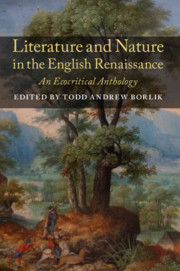Book contents
- Frontmatter
- Contents
- List of Illustrations
- Acknowledgements
- Editorial Principles: Towards the Ecocritical Editing of Renaissance Texts
- Introduction
- PART I Cosmologies
- PART II The Tangled Chain
- PART III Time and Place
- Seasons
- Country Houses
- Gardens
- Pastoral: Pastures, Meadows, Plains, Downs
- Georgic: Fields, Farms
- Forests, Woods, Parks
- Heaths, Moors
- Mountains, Hills, Vales
- Lakes, Rivers, Oceans
- PART IV Interactions
- PART V Environmental Problems in Early Modern England
- PART VI Disaster and Resilience in the Little Ice Age
- Appendix A Industrialization and Environmental Legislation in the Early Anthropocene: A Timeline
- Appendix B Further Reading: A Bibliography of Environmental Scholarship on the English Renaissance
Gardens
from PART III - Time and Place
Published online by Cambridge University Press: 05 June 2019
- Frontmatter
- Contents
- List of Illustrations
- Acknowledgements
- Editorial Principles: Towards the Ecocritical Editing of Renaissance Texts
- Introduction
- PART I Cosmologies
- PART II The Tangled Chain
- PART III Time and Place
- Seasons
- Country Houses
- Gardens
- Pastoral: Pastures, Meadows, Plains, Downs
- Georgic: Fields, Farms
- Forests, Woods, Parks
- Heaths, Moors
- Mountains, Hills, Vales
- Lakes, Rivers, Oceans
- PART IV Interactions
- PART V Environmental Problems in Early Modern England
- PART VI Disaster and Resilience in the Little Ice Age
- Appendix A Industrialization and Environmental Legislation in the Early Anthropocene: A Timeline
- Appendix B Further Reading: A Bibliography of Environmental Scholarship on the English Renaissance
Summary
A garden is always a battleground, an attempt by humans to stake out a plot of land for their exclusive use. Naturally, other species do not acknowledge our right to monopolize vast patches of the earth, provoking humans to devise a number of strategies for deterring or destroying perceived invaders. In the first English gardening manual, Thomas Hill shares dozens of recipes for protecting crops, some involving sympathetic magic and others deploying what we would now call biological pest control, such as training cats and tame weasels to catch moles. In the mid-twentieth century this traditional lore gave way to synthetic pesticides like DDT, which prompted Rachel Carson to write her landmark expose Silent Spring, kick-starting the modern environmental movement.
Source: The Gardener's Labyrinth (1577), 30–3, 66, 69, 71.
All worthy Writers agree that in vain the husbandly Gardener shall travail … if the Seeds bestowed in the earth [31] happen after to be endamaged, either of Worms and other creeping things, or otherwise scraped up and wasted by Birds … [So] that the owner or Gardener may avoid these injuries, it is high time that he employ a care and diligence in the conceiving of these remedies and secrets following. If Seeds to be committed to the Earth are a little time before the bestowing steeped in the juice of Houseleek or Sengreen, they shall not only be without harm preserved from Birds, Ants, Field Mice, and other spoilers of the garden herbs, but what plants shoot up of these shall after prove the better and worthier …
And for lack of this herb altogether, [Columella °] reporteth that the Gardener may use instead of it the Soot cleaving on the chimney, which gathered a day before the bestowing of the seeds in the earth and mixed for a night with them, doth the like defend the seeds in safety.
The Greek writers of husbandry … report that those seeds may be preserved in safety from all evil and garden monsters if the bare head, without flesh, of either Mare or She-ass (having been covered of the male) be buried in the Garden, or that the middest ° of the same fixed on a stake set into the earth be erected.
- Type
- Chapter
- Information
- Literature and Nature in the English RenaissanceAn Ecocritical Anthology, pp. 232 - 245Publisher: Cambridge University PressPrint publication year: 2019



